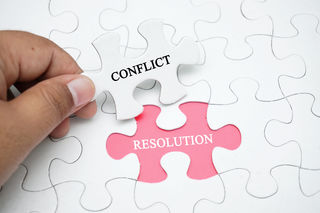Politics
Keep the Conflict Small: 4 Tips to Avoid High Conflict
In families, dating, work and even in politics, don’t get emotionally hooked.
Posted November 17, 2019 Reviewed by Ekua Hagan

After 40 years of providing conflict resolution services, one of the biggest mistakes I have found that people make is to quickly expand their conflicts in an effort to “win” a dispute. Emotions take over and a minor issue becomes about the whole person (“You’re just a bully!” “You’re just a baby!”) or about the whole history of the relationship (“You always…!” “You never…!”), and sometimes about everyone similar to you (“You people always…!” “Your ilk never…!”). High-conflict people do this a lot, but many people get hooked into this escalation from time to time.
Needless to say, this makes it much harder to resolve a conflict. In reality, most conflicts are resolved around small details. And many relationship conflicts are actually never resolved but managed sufficiently for people to live with them and focus on more important matters in their relationship.
Here are a few key tips that have helped many people:
1. Avoid bringing up other issues. Stay focused on the issues at hand and understanding each other’s point of view about it. See if you can identify the single interest underneath their complaint or concern. Interests can usually be put into one or two words that are positive, such as getting more: respect, freedom, money, knowledge, intimacy, friendship, security, cleaning up, etc. If you can, take turns to thoroughly listen to the other person and see if you can identify their interest in the argument. Also, see if you can identify your own interest in the dispute and how to express it in simple terms. Then see if you can resolve that or agree to disagree.
2. Focus more on future solutions than on the past. The past cannot be changed and often people cannot even agree on what happened 10 minutes ago. It’s better to focus on the future and what you can actually do about it now. Think of proposals that include your interest and their interest in the conflict, or ask the other person for a proposal, suggestion, etc.
For example: “You said you would do the dishes before you went to bed. Once again, you forgot. You’re always so irresponsible. You’re just like your whole family.” Hold on: What do you want? “I want a clean home. I want you to develop a system of remembering the dishes. Any ideas?”
3. Avoid bringing other people into it. Many people are tempted to copy their angry emails to several other people when they are complaining to one person. Sometimes this is a conscious decision. However, in general, it is better to involve the fewest people possible. When you add more, the other person is likely to feel ganged up on. Even though you might feel more powerful or secure in confronting someone with a group behind you, it will increase the other person’s defensiveness—which will decrease their likelihood to be open to whatever you wanted to say. If you do need to involve someone else, see if you can keep it to one person, and invite the other person to have someone present as well, with a focus on bringing solutions.
For example: In workplace disputes, sometimes several people want to confront a co-worker or manager on some problem with their behavior. But this will escalate their resistance to listening and problem-solving. It’s better to just have one person, or two at most, to discuss the issue with the individual. Of course, there are times when it is already a large dispute (such as a pattern of bullying by several people), in which case a union or human resources or upper management may have to become involved.
4. Avoid engaging with high-conflict people. High-conflict people (HCPs) have an ongoing pattern of starting or increasing conflicts by doing the things I am suggesting not to do here. They seem to throw out challenges to see who will get emotionally hooked into arguing with them. It’s very tempting to respond this way, especially when you can see how absurd and emotional the statements are that they’re saying. However, once you realize that you are dealing with an HCP, don’t take the bait and let it go. You’re not going to change how they think. It’s usually best to end the discussion, either by changing the subject or leaving. Otherwise, it can be like quicksand and you will get deeper and deeper into an unnecessary conflict. Remember: HCPs rarely change how they think, which is why they are stuck in a pattern of high-conflict behavior they can’t see.
For example: “When it comes to politics, you don’t know what you’re talking about. I can’t believe you’re so stupid as to listen to that politician. It’s just like you and your ilk to think that way….” Once you hear such strongly disparaging personal remarks about yourself, your intelligence, sanity, morals, or a politician you may like, it’s best to end this conversation. These are warning signs of a high-conflict person—or someone who is mirroring today’s high-conflict political rants. A productive discussion would involve two or more people who can focus on specific policies and ask questions about them and state simply why they agree or disagree or propose something else. Until recently, that has been how the majority of people discussed these issues. Sadly, today’s political discussions are often dominated by people with high-conflict tendencies.
Conclusion
These four tips may seem obvious and easy to most people. But we all could practice them more often. I have worked with thousands of people as a lawyer, therapist, and mediator, and most often people are stuck doing what they could have avoided at the start. Much of my work has been to help them get unstuck emotionally so that they can resolve their disputes—or get away from other people who are still stuck (often as HCPs).
HCPs tend to relate to people through conflict and often seek relationships in which they can engage in their high-conflict behavior. They say that the four skills above are undesirable or impossible to learn. If you’re already involved with someone like this, practice the tips above to manage or move away from the relationship. If you think you may have a high-conflict personality, do what you can to practice these tips. Often people ask how they can change. Keeping it small is a good place to start.
If you’re interested in learning more about high-conflict situations and personalities, our High Conflict Institute in the United States has joined with Newcastle University School of Law in Australia to present a free online course that is an introduction to high conflict.




